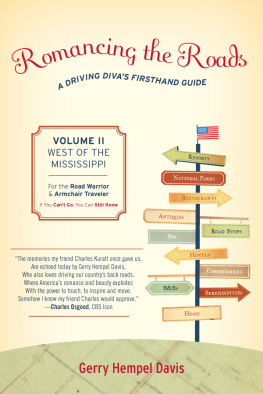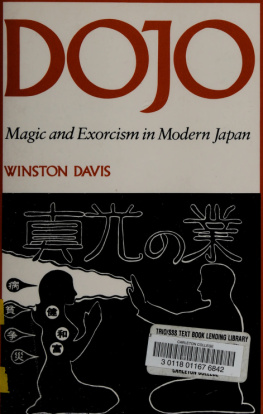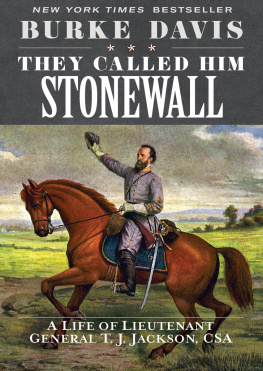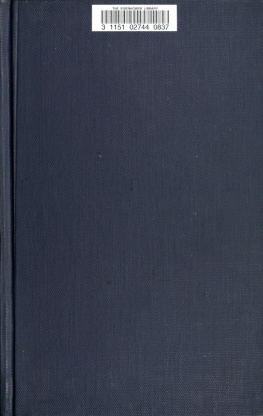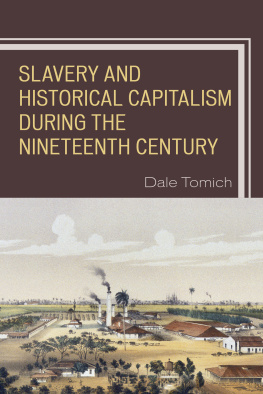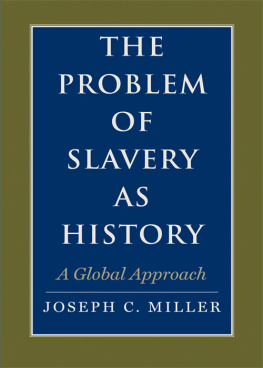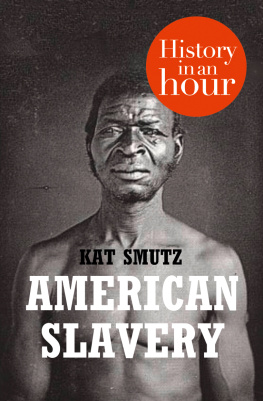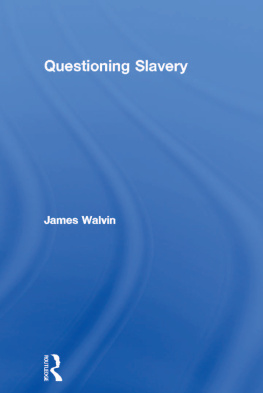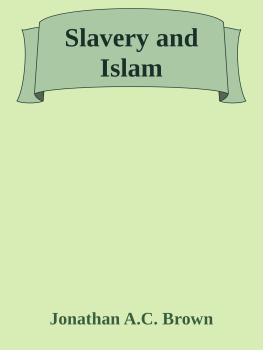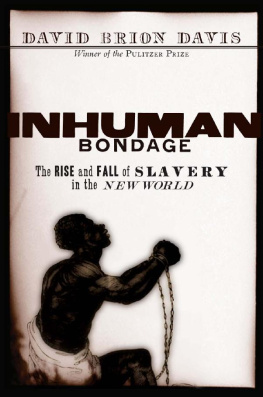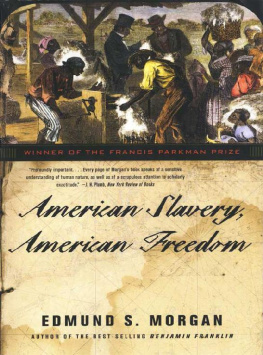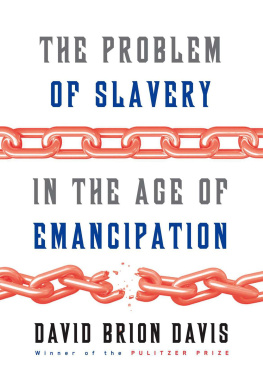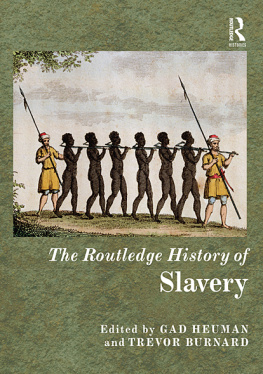The Problem of Slavery in the Age of Revolution 17701823
OTHER BOOKS BY DAVID BRION DAVIS
Homicide in American Fiction, 17981860
The Slave Power Conspiracy and the Paranoid Style
The Problem of Slavery in Western Culture
Was Thomas Jefferson an Authentic Enemy of Slavery? (printed lecture)
The Great Republic (Part III, Expanding the Republic, 18201860)
The Emancipation Moment (printed lecture)
Slavery and Human Progress
Slavery in the Colonial Chesapeake
From Homicide to Slavery: Studies in American Culture
Revolutions: Reflections on American Equality and Foreign Liberations
EDITOR OF
Ante-Bellum Reform
The Fear of Conspiracy: Images of Un-American Subversion from the Revolution to the Present
Antebellum American Culture: An Interpretive Anthology
(With Steven Mintz), The Boisterous Sea of Liberty: A Documentary History of America from the Discovery Through the Civil War
The Problem of Slavery in the Age of Revolution 17701823
David Brion Davis

Oxford University Press
Oxford New York
Athens Auckland Bangkok Bogot Buenos Aires Calcutta
Cape Town Chennai Dar es Salaam Delhi Florence Hong Kong Istanbul
Karachi Kuala Lumpur Madrid Melbourne Mexico City Mumbai
Nairobi Paris So Paulo Singapore Taipei Tokyo Toronto Warsaw
and associated companies in
Berlin Ibadan
Copyright 1999 by David Brion Davis
First published in 1975 by Cornell University Press
124 Roberts Place, Ithaca, NY 14850
First issued by Oxford University Press, 1999
Oxford University Press, Inc.
198 Madison Avenue, New York, New York 10016
Oxford is a registered trademark of Oxford University Press
All rights reserved. No part of this publication may be reproduced,
stored in a retrieval system, or transmitted, in any form or by any means,
electronic, mechanical, photocopying, recording, or otherwise,
without the prior permission of Oxford University Press.
Library of Congress Cataloging-in-Publication Data
Davis, David Brion
The problem of slavery in the age of revolution,
17701823 / David Brion Davis.
p. cm.
Includes bibliographical references and index.
ISBN 019-5126718 (pbk.)
1. Slavery. I. Title.
HT867.D38 1998
306.36209035dc21 9819513
987654321
Printed in the United States of America
on acid-free paper
FOR TONI,
Who taught me that it is possible
to accept another persons consciousness
with all its distinctness, unknownness, and knowingness
on a parity with ones own, with love
Contents
Preface to the New Edition
In his original draft of the Declaration of Independence, Thomas Jefferson gave vivid expression to various layers of the problem of slavery in the Age of Revolution. After accusing King George III of inciting attacks from the merciless Indian savages and of bribing loyalist insurrections with the allurements of forfeiture & confiscation of our property, Jefferson made three distinct points as he came to the climax of his long series of indictments:
[1] He [the King] has waged cruel war against human nature itself, violating its most sacred rights of life and liberty in the persons of a distant people who never offended him, captivating & carrying them into slavery in another hemisphere or to incur miserable death in their transportation thither, this piratical warfare, the opprobrium of infidel powers, is the warfare of the CHRISTIAN king of Great Britain.
[2] determined to keep open a market where MEN should be bought & sold, he has prostituted his negative for suppressing every legislative attempt to prohibit or to restrain this execrable commerce:
[3] and that this assemblage of horrors might want no fact of distinguishing die, he is now exciting those very people to rise in arms among us, and to purchase that liberty of which he has deprived them, by murdering the people upon whom he also obtruded them; thus paying off former crimes committed against the liberties of one people, with crimes which he urges them to commit against the lives of another.
Garry Wills has argued convincingly that this entire paragraph, which Congress deleted from the final Declaration of Independence, was governed by Jeffersons third point: the vulnerability of slaveholding societies to insurrection, and the willingness of the Kings agent, Lord Dunmore, the royal governor of
Dunmores tactical use of this potential weapon of mass destruction inflamed the entire South, even though Dunmore had acted on his own and had no intention of igniting a massive slave insurrection. For Jefferson, as Wills puts it, the proclamation was the final example of Britains war atrocities that justified a counter-proclamation of independence. Yet even in 1776 a would-be nation of slaveholders faced a dilemma when making an appeal based on moral principle to the opinions of mankind. In Willss words, the irony of charging the King with manumission as a crime led Jefferson to write his tortuous preamble to this charge. He was trying to erect a shaky moral platform from which to denounce the novel atrocity of freeing slaves.
While there is doubtless much truth in this judgment, it should not detract from the sincerity of Jeffersons condemnation of the slave trade. In his Summary View of 1774, intended to serve as instructions for Virginias delegates to the first Continental Congress, Jefferson declared, with astonishing exaggeration, that the abolition of domestic slavery is the great object of desire in those colonies where it was unhappily introduced in their infant state, and he went on to argue that the first step toward this goal would have to be the prohibition of further slave importations from Africa, a step which the Crown had prevented Virginia from taking.
Jeffersons scathing denunciation of the slave trade in his original draft of the Declaration of Independence resembled the language and concepts found in such early and classic antislavery works as Anthony Benezets A Short Account of That Part of Africa, Inhabited by the Negroes, which quoted antislavery passages from Francis Hutcheson, James Foster, Richard Savage, J. Philmore, and George Wallace. Jeffersons references to the British waging cruel war and captivating and carrying them into slavery conveyed the false impression that armies of white Christians were violently seizing millions of passive Africans and marching them to slave ships (the fact that Africans were enslaved by other Africans, transported to the coast, and sold to Europeans or Americans should in no way mitigate the evil and horror of this trade in human beings, but most antislavery writers had difficulty in facing the truth regarding African participation).
The rhetoric Jefferson had adopted concerning piratical warfare and the violation of sacred human rights had led some earlier writers to very radical conclusions. Thus in a passage quoted by Benezet in 1762 and by Granville Sharp in 1771, an English writer who called himself J. Philmore had proclaimed, No Legislature on Earth, which is the supreme power in every Civil Society, can alter the Nature of things, or make that to be lawful, which is contrary to the Law of God. This was a statement that Jefferson could have endorsed presumably, since its claim lay at the heart of the Declaration of Independence and of the entire Age of Revolution, even after Nature replaced God.
Next page


